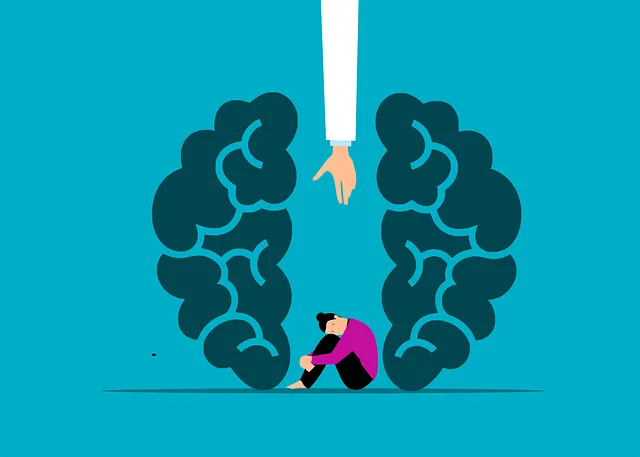Depression is a global concern requiring early recognition and comprehensive support. Lone Tree Kaiser Permanente's (LTP) mental health coverage offers a suite of services, including therapy, programs, and education through its Mental Wellness Podcast Series, focusing on holistic well-being. They promote healthy lifestyles, provide resources for physical, nutritional, and sleep balance, and emphasize social connections. LTP prioritizes evidence-based therapies like CBT and MBSR, enhances these with journaling, exercise guidance, and empathy building, and fosters open dialogue through cultural competency training and stigma reduction initiatives. Building support networks is key, with healthcare providers guiding access to community resources and ensuring personalized, compassionate care.
Depression is a prevalent yet manageable condition, and preventing it can be as simple as making positive lifestyle changes. This article explores various strategies to combat depression, from recognizing signs and understanding mental health coverage like Lone Tree Kaiser Permanente’s services, to adopting healthier routines. We delve into therapeutic approaches, emphasizing the power of support networks for prevention and recovery. By combining these methods, individuals can take charge of their mental well-being and lead happier lives.
- Understanding Depression: Recognizing the Signs and Symptoms
- The Role of Lone Tree Kaiser Permanente Mental Health Coverage
- Lifestyle Changes for Enhanced Mental Well-being
- Therapeutic Approaches to Combat Depression
- Building a Supportive Network for Prevention and Recovery
Understanding Depression: Recognizing the Signs and Symptoms

Depression is a complex mental health condition that affects millions worldwide. Understanding its intricacies is the first step in prevention. Recognizing the signs and symptoms is crucial, as it can vary greatly from person to person. Common indicators include persistent feelings of sadness, loss of interest or pleasure in activities once enjoyed, changes in appetite and sleep patterns, fatigue, difficulty concentrating, and thoughts of death or suicide. These signs may be subtle at first, making it essential to stay vigilant and observe any unusual behavior or emotional shifts.
The Lone Tree Kaiser Permanente mental health coverage offers comprehensive support for individuals seeking assistance. By raising awareness about these symptoms, we can encourage people to seek help early on, which is vital in managing and preventing depression. Additionally, fostering a culture of open dialogue about mental health through Mental Health Policy Analysis and Advocacy can lead to improved self-esteem and confidence, as individuals become more empowered to take charge of their well-being.
The Role of Lone Tree Kaiser Permanente Mental Health Coverage

Lone Tree Kaiser Permanente’s mental health coverage plays a pivotal role in addressing depression and promoting overall well-being within the community. This comprehensive program offers a range of services designed to support individuals experiencing depressive disorders, from therapy sessions with licensed professionals to specialized programs tailored for specific needs. By integrating these services into their healthcare network, Kaiser Permanente empowers residents to take proactive steps towards mental wellness.
The organization’s focus on burnout prevention strategies for healthcare providers is particularly notable. Recognizing the high-stress nature of the medical field, they provide resources and support to help professionals manage their own emotional intelligence and maintain healthy boundaries. This approach not only benefits individual practitioners but also has a positive ripple effect on patient care, as emotionally intelligent healthcare providers can offer more empathetic and effective treatment for depression and other mental health concerns. Additionally, Lone Tree Kaiser Permanente’s Mental Wellness Podcast Series Production contributes to the wider community by offering accessible educational content on various aspects of mental wellness, fostering open conversations around sensitive topics like depression prevention.
Lifestyle Changes for Enhanced Mental Well-being

Adopting a healthy lifestyle can significantly contribute to depression prevention and overall mental well-being. Lone Tree Kaiser Permanente mental health coverage offers resources for individuals seeking support in this area. Regular exercise, balanced nutrition, and adequate sleep are fundamental pillars. Physical activity releases endorphins, which act as natural mood boosters, while a nutritious diet provides essential brain-nourishing nutrients. Adequate rest is crucial for emotional regulation and cognitive function.
Additionally, social connections and meaningful activities play vital roles. Building and maintaining strong relationships can foster empathy and provide a support system. Lone Tree Kaiser Permanente’s mental health services also emphasize the importance of cultural competency training for healthcare providers, ensuring that individuals from diverse backgrounds receive empathetic care tailored to their unique needs. Compassion cultivation practices, such as mindfulness and self-care routines, can further enhance resilience and promote positive mental health.
Therapeutic Approaches to Combat Depression

Depression prevention strategies often involve therapeutic approaches that can be highly effective. One such method is cognitive-behavioral therapy (CBT), which helps individuals identify and change negative thought patterns and behaviors contributing to their depression. This evidence-based practice is widely recognized and covered by mental health coverage providers like Lone Tree Kaiser Permanente, making it accessible for those seeking support.
Additionally, Mindfulness-Based Stress Reduction (MBSR) and interpersonal therapy have proven beneficial. MBSR encourages individuals to focus on the present moment through mindfulness practices, fostering better emotional regulation. Interpersonal therapy, on the other hand, focuses on building empathy and improving relationships, as social connections play a vital role in mental wellness. Incorporating Mental Wellness Journaling, Exercise Guidance, and Empathy Building Strategies can further enhance these therapeutic approaches, contributing to a holistic approach to depression prevention.
Building a Supportive Network for Prevention and Recovery

Building a strong support network is a cornerstone of depression prevention and recovery, especially in addressing the challenges faced by individuals at Lone Tree Kaiser Permanente seeking mental health coverage. This involves fostering connections with family, friends, or even support groups who can offer understanding, encouragement, and practical help. A supportive network provides a sense of belonging and can be instrumental in early detection and intervention, which are crucial for managing depressive symptoms effectively.
The role of healthcare providers in this context is multifaceted. They can facilitate connections to community resources, offer guidance on navigating mental health coverage options like those available at Lone Tree Kaiser Permanente, and integrate Cultural Competency Training to ensure sensitive and effective care. Additionally, Mental Illness Stigma Reduction Efforts can encourage open conversations about depression, fostering an environment where individuals feel comfortable seeking help without fear of judgment. Similarly, prioritizing Burnout Prevention among healthcare professionals is vital to maintaining consistent and compassionate support for those dealing with depressive disorders.
Preventing depression is a multifaceted approach, from recognizing early signs through lifestyle adjustments to leveraging resources like Lone Tree Kaiser Permanente mental health coverage. By adopting therapeutic strategies and building a supportive network, individuals can significantly enhance their mental well-being. These comprehensive prevention methods empower folks to navigate life’s challenges with resilience and hope.






